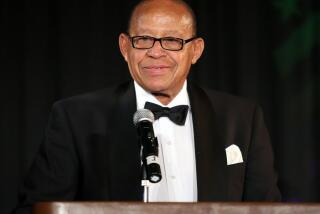Richard L. Strout; Covered Political Scene for 60 Years
- Share via
Richard L. Strout, the venerable journalist who began covering presidential press conferences when Warren G. Harding would show up in golf knickers and was on hand as they evolved into the stylized, televised spectaculars of the Ronald Reagan White House, has died.
Strout, who reported for the Christian Science Monitor for more than 60 years while also writing the political column “TRB From Washington” in the New Republic magazine from 1943 to 1983, was 92 when he died Sunday night at Georgetown University Medical Center in Washington.
Godfrey Sperling, a longtime colleague at the Monitor, told the Associated Press that Strout had been hospitalized after a fall on Aug. 8.
One of the most revered members of the nation’s press corps, Strout was esteemed by colleagues and readers alike for his biting insight and historical perspective.
He personally liked Harding, he said shortly before retiring. He said of former President Jimmy Carter, “Poor old Carter, who didn’t know the game rules when he came here.” And he considered Franklin D. Roosevelt the most effective of all the 12 Presidents he had covered.
Under Strout, the TRB column became one of the most widely echoed sources of liberal political opinion in the nation.
When he gave it up, the New Republic’s editors observed, “You don’t get out of Strout’s church without hearing the sermon, but the hymns are lovely. . . . He looks and listens, and tells you what he has seen and heard in vivid, simple words.”
Strout described the Eisenhower Administration as “government by sedative” and likened Sen. Joseph R. McCarthy (R-Wis.) to “a mist that carries lethal contagion.”
Of Richard M. Nixon, then vice president, he wrote in 1958, “He is out for the kill and the scalp at any cost.”
After his retirement, his name remained on the magazine’s masthead as a contributing editor. Like his predecessors, Strout wrote the column in anonymity but in recent years it has been signed, currently by senior editor Michael Kinsley.
The name TRB was coined by Bruce Bliven, an editor of the magazine before it moved from New York to Washington. Bliven, who carried his copy to the office by subway, said the initials stood for Brooklyn Rapid Transit in reverse.
On his 80th birthday in 1978, Strout, still active, said, “If you live long enough, people confuse ability with longevity. I’m just an analytical writer with some color. I’m not a whiz-bang.”
The same year, he was given a special citation by the Pulitzer Prize committee for his lifetime achievement. Strout also won the George Polk Memorial Award in 1958 and the National Press Club’s Fourth Estate Award in 1975, among others.
Strout was raised in Brooklyn by a father who taught English and wrote poetry.
He graduated from Harvard in 1919 and then worked his way across the Atlantic on a grain ship. He reported for two years for a paper in Sheffield, England, and returned to the United States where he was hired by the Boston Post before joining the Monitor in 1922.
His assignments ranged from the Teapot Dome scandal in the Harding Administration to presidential political conventions and campaigns to Roosevelt’s New Deal efforts to deal with the Depression and on through the Allied invasion of Normandy on D-Day in 1944.
Strout gradually became critical of the American electoral process, citing the ongoing decay in voter turnout, which he laid to disillusionment.
He advocated adaptation of the parliamentary system of government used in Britain and Canada but acknowledged that “the Founding Fathers tied us up so we can’t change.”
In his final column, in April, 1983, Strout reflected on the divergences he had witnessed in Washington.
“I sometimes think,” he wrote, “that you can measure the passage of time by counting the things that couldn’t happen. A Roman Catholic couldn’t be elected President. Schools couldn’t be desegregated. Government couldn’t expand budgets in a depression. Birth control couldn’t be discussed in terms of national policy. Public welfare was ‘socialism.’ American troops couldn’t be stationed in Europe in peacetime. We couldn’t lose a war.”
As for democracy itself, Strout quoted E. B. White:
“Democracy is the recurrent suspicion that more than half the people are right more than half the time.”
More to Read
Sign up for Essential California
The most important California stories and recommendations in your inbox every morning.
You may occasionally receive promotional content from the Los Angeles Times.













